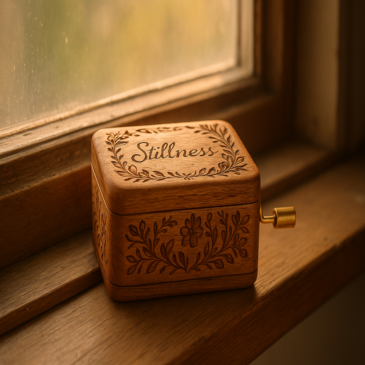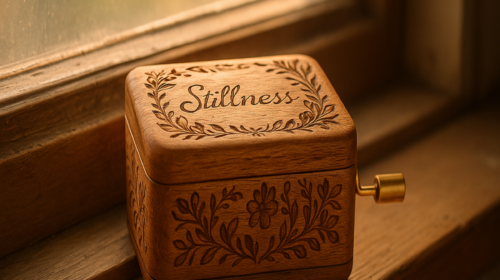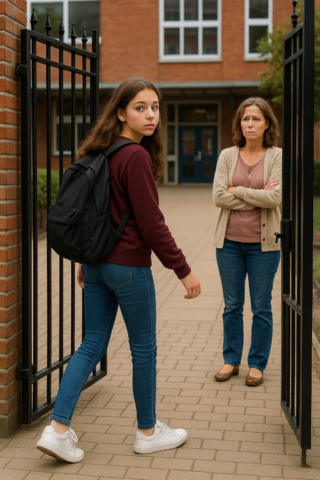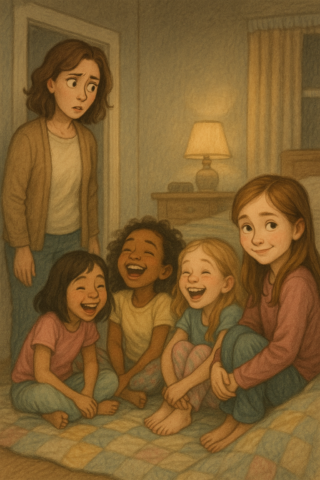I didn’t plan to take anyone in that night.
It was early January in Portland. Rain pelted the city relentlessly, and the sidewalks shimmered with reflections of streetlights and passing cars. I was walking back from the grocery store when I saw her—curled up beside the entrance of a closed bakery, soaked through, hugging a threadbare backpack like it held the last pieces of her life.
Her eyes met mine for only a second. Blue. Sharp. But tired.
Normally, I’d keep walking. Not because I didn’t care, but because I never quite knew what to do. I’d been burned before—given out money, food, even bus fare that turned into liquor. But something about her stopped me.
I hesitated, then offered the umbrella I had just bought. She stared at me, then whispered, “Thank you.”
That moment should’ve ended there. But I heard myself saying, “Do you want a warm meal?”
Her name was Rachel. She looked around 50, but life had aged her. We ate at a nearby diner. She barely touched her food, more focused on warming her hands on the coffee mug. I found out she had once been a high school teacher in Sacramento before her world fell apart after losing her daughter in an accident. The grief had swallowed her whole, and with no close family and her health declining, she drifted.
I don’t know what possessed me to say it, but as we left the diner, I asked, “Do you need a place tonight?”
She looked stunned. “I don’t want charity.”
“It’s not charity,” I said. “It’s just… shelter from the rain.”
That one night became three. Three became a week. Then two. Soon, Rachel was quietly helping with laundry, watering my plants, and keeping to her small corner of the guest room. She never asked for anything.
Over six months, we became something like… odd friends. She taught me how to cook a perfect omelet. I showed her how to use my tablet to read library books. Some nights, we’d sit in silence watching old black-and-white films. She never opened up much more about her past, and I didn’t push.
But she gave me something unexpected: presence. I had lived alone since my divorce three years earlier. My apartment always felt like a waiting room. But with Rachel there, it felt… lived in. Alive.
One summer morning, I came home from work to find the apartment oddly quiet. Her shoes were gone. The note was on the kitchen table:
“Thank you, Claire, for seeing me. For believing I still had worth. I needed this time to remember who I was. I’ll never forget you. – R”
I sat there for a long time, heart aching with the kind of emptiness that’s only left by someone who mattered.
Two weeks later, I received a package. No return address. Inside was a small wooden box and a single envelope.
The letter read:
“Claire,
You once asked me what I did before all this. I told you I was a teacher. But I never told you what I truly loved—woodwork. My father taught me. After my daughter passed, I stopped building things. It felt pointless. But while I stayed with you, I found myself sketching again at night. You gave me something I had lost long ago—dignity and trust. So I made you this. My hands are old and shaky, but it’s the best I could do.”
I opened the box.
Inside was a hand-carved music box made of maple and walnut, smoothed and polished with care. Delicate floral engravings wrapped around it, and in the center, the word “Stillness” was etched in graceful script.
I turned the small brass crank. A soft melody drifted out—a lullaby I didn’t know, but it brought tear s instantly. Gentle, aching, and somehow… hopeful.
s instantly. Gentle, aching, and somehow… hopeful.
I wept.
Not just because of the gift. But because of what it meant.
Rachel didn’t give me a thing—she gave me a reminder. That even the most broken lives still carry beauty. That offering shelter is more than just giving space—it’s about honoring someone’s story. And sometimes, a second chance is not only for the person we help… but for ourselves.
Final Thought:
We often overlook those who live on the fringes of our world, forgetting that their lives once mirrored our own—full of routines, people they loved, and quiet dreams. Rachel reminded me that healing is rarely loud. It arrives in shared silences, in unexpected friendships, and in hand-carved gifts that echo through our hearts long after the giver is gone. If we dare to reach across the divide, we may discover that saving someone else just might save us, too.


